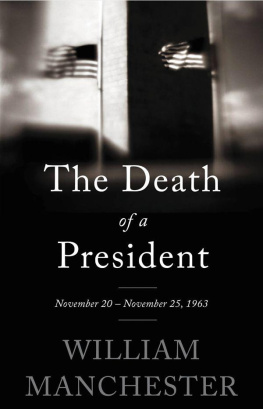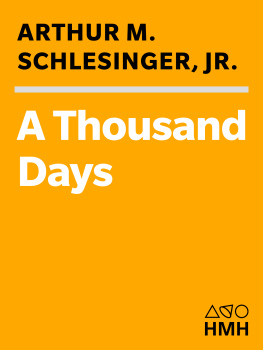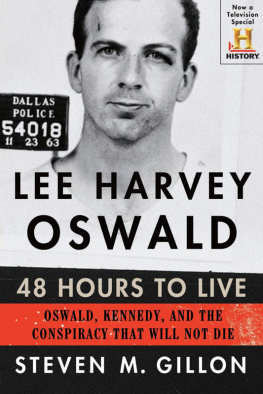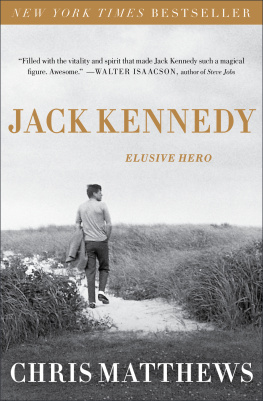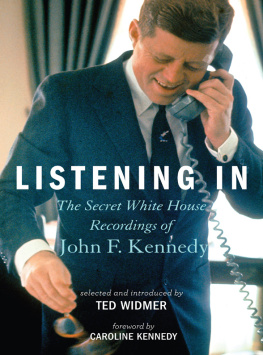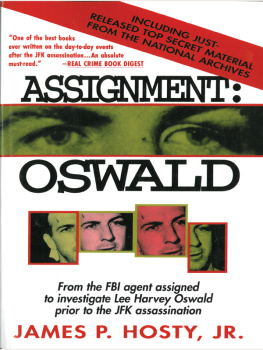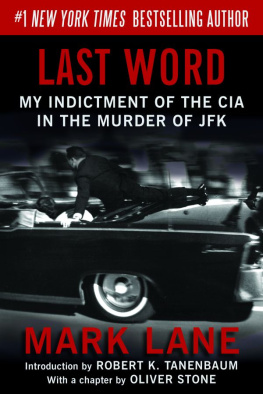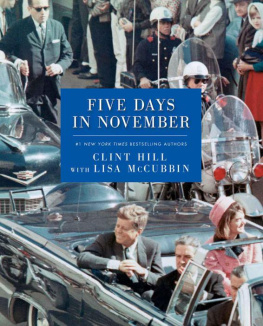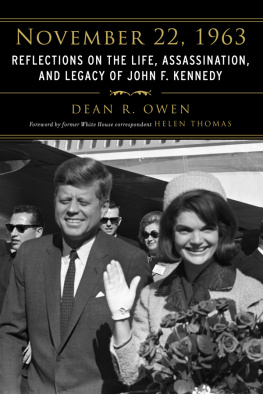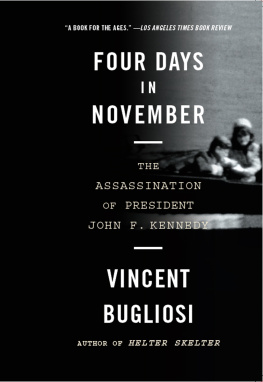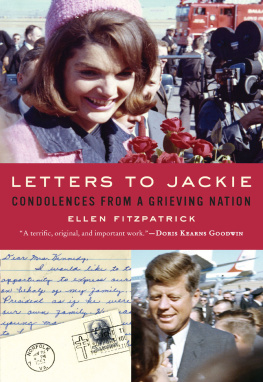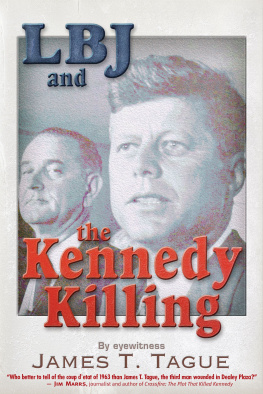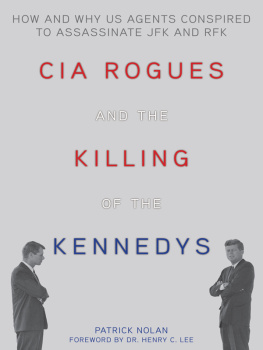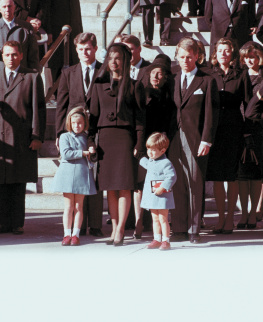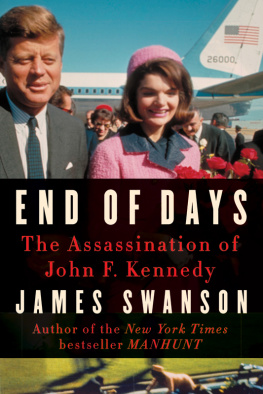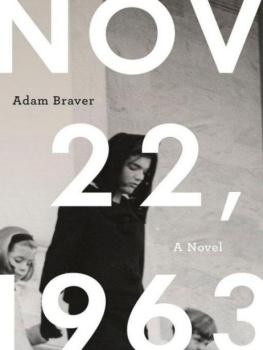The Death of a President
November 20November 25
1963
By William Manchester

In accordance with the U.S. Copyright Act of 1976, the scanning, uploading, and electronic sharing of any part of this book without the permission of the publisher constitute unlawful piracy and theft of the authors intellectual property. If you would like to use material from the book (other than for review purposes), prior written permission must be obtained by contacting the publisher at permissions@hbgusa.com. Thank you for your support of the authors rights.

For all
in whose hearts
he still lives
a watchman of honor
who never sleeps
On February 5, 1964, Mrs. John F. Kennedy suggested that I write an account of the tragic and historic events in Texas and Washington ten weeks earlier. That is the first breath. The second, which must quickly follow, is that neither Mrs. Kennedy nor anyone else is in any way answerable for my subsequent research or this narrative based upon it. My relationships with all the principal figures were entirely professional. I received no financial assistance from the Kennedy family. I was on no government payroll. No one tried to lead me, and I believe every reader, including those who were closest to the late President, will find much here that is new and some, perhaps, that is disturbing. That is my responsibility. Mrs. Kennedy asked me but one question. Before our first taping session she said, Are you just going to put down all the facts, who ate what for breakfast and all that, or are you going to put yourself in the book, too? I replied that I didnt see how I could very well keep myself out of it. Good, she said emphatically. And so I am here, weighing evidence and forming judgments. At times you may find my presence exasperating. You may decide in the end that I have been a poor judge. But you may not conclude that I have served as anyones amanuensis. If you doubt me you may as well stop at the end of this paragraph.
Actually, I discovered, the Kennedy family had not been eager to have any book written about the Presidents death. Understandably they needed time to heal. But shortly after the burial in Arlington various writers solicited their cooperation in such a project. It soon became apparent that volumes would appear in spite of their wishes. Under these circumstances Jacqueline Kennedy resolved that there should be one complete, accurate account. I had not been among those who had approached her. (I had been living in the Ruhr, and was writing German history.) At that time I had not even met her. However, her husband had told her about me, and she had read a magazine profile I published about him the year before his death. Robert Kennedy also remembered my acquaintance with his brother. After consultation other members of the family agreed with Mrs. Kennedy that, in light of the fact that apocryphal versions of those days were already in press, it would be wise to have a book written by an author whom the President had known. It was further decided that the work should be based upon material gathered while memories were still fresh. Hence the invitation to me.
My first two calls were upon Bill Moyers at the White House and Chief Justice Earl Warren. It was essential that the new President, whose confidence Moyers deservedly enjoyed, know what I proposed to do. It was equally imperative that the Presidential Commission which the Chief Justice headed understand the exact nature of my inquiry. The Chief Justice was unfailingly polite to me, and he recognized that while the lines of the two investigations might occasionally intersect, they certainly did not run parallel to one another. The Commission was conducting a criminal probe. I was exploring the full sweep of events during what were, in some respects, the most extraordinary hours in the history of our country. They were focusing upon the assassin of a President, I upon the Presidency itself.
During the next six months we exchanged some confidences, and inevitably we ran across each others tracks. Sometimes I had been there first; I saw John McCone a month before the Commission did, and I interviewed Mrs. Johnson three weeks before she sent her statement to Earl Warren. On the other hand, I did not begin my Texas trips until the last member of the Commission had left Dallas, and its report to President Johnson was on the bookstore counters long before I scheduled the first of my formal interviews with Secret Service agents. By then I was alone in the field. I was to remain there until early 1966, when the trail began to grow cold. It therefore seems fair to assume that should any new studies of this subject appear in the near future, they must be largely based upon the Commissions work, mine, or both. Had any other major investigator been around, I certainly would have heard the echo of his footsteps.
Because I have been at this task longer than anyone else I have not only felt entitled to record my opinions; I believe that I have an inescapable obligation to do so. Withholding them would be shirking a grave duty, and among other judgments you will find a partial assessment of the Warren Report. An audit of my chief sources of information appears at the end of this volume. Unlike the Commission, however, I shall not publish my files. For one thing, it would be a formidable undertaking. (Mrs. Kennedys answers to the Commissions questions occupy two and a half pages; my tapes with her run ten hours.) But that is not the chief reason. Throughout this work I was obliged to weigh questions of taste. Indeed, the final manuscript was so sensitive that the authors judgment seemed an inadequate safeguard against possible lapses in taste. Therefore the advice of five men with special qualifications was solicitedtwo close friends of the Kennedy family, two Special Assistants to the President who served under both John Kennedy and Lyndon Johnson, and the editor of Profiles in Courage, who also edited this book. The suggestions of each were carefully weighed. This is not to suggest that I am suppressing anything. I am merely retaining, for the time being, material of a personal nature which serves no legitimate purpose. Should there be any who think this means that I intend to dodge prickly issues, they have obvious recourse. To paraphrase President Kennedys Berlin challenge, Lass sie nach dem Buche kommen.
The moment I began to write I went to the mat with the issue of annotation. I arose with a painful verdict: no page-by-page footnotes, other than those necessary to the immediate sense of a passage. It hurt because I knew that every statement, every fact, every quotation in my manuscript could be followed by a citation. Throughout the text you will, of course, find the names of individuals to whom data are clearly attributed. Chapter notes, however, would require a tag for everything. The protection of sources prohibits such procedure here. Arthur M. Schlesinger, Jr., who faced the same problem, reached the same conclusion. He will place a fully annotated manuscript under seal in the Kennedy Library. Similarly, I am considering the deposit there of eighteen volumes of transcribed interviews, which I have indexed as appendices to this book, and twenty-seven portfolios of documents, with the understanding that all these would be made available to qualified scholars after the death of all direct descendants of John F. Kennedy who were living at the time of his assassination.
A word about method. In the course of the inquiry I approached every person who might shed light upon this complex of events. I retraced President Kennedys last journey from Andrews Field to San Antonio, Kelley Field, Houston, Carswell, Fort Worth, Love Field, Dealey Plaza, Parkland Hospital, back to Love and back to Andrews, over the ambulance route to Bethesda Naval Hospital and then to the White House, the great rotunda, St. Matthews, and Arlington. I went over every motorcade route, searching for men and women who had been spectators, and in Dallas I walked from Love Field to the overpass, looking for potential snipers nests as well. Every scene described in the book was visited: the rooms in the executive mansion, Hickory Hill, Brooks Medical Center, the Presidential hotel suites in Houston and Fort Worth, the Houston Coliseum, the Fort Worth parking lot and ballroom, the Paine garage and bedrooms, Marguerite Oswalds house, Oswalds tiny room in Dallas, Parklands Major Medicine and Minor Medicine areas, Bethesdas seventeenth-floor suite and basement morgue, the pavements of Washington, the pews of St. Matthews.

